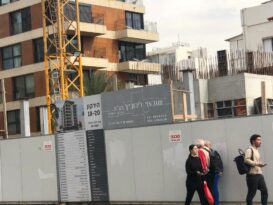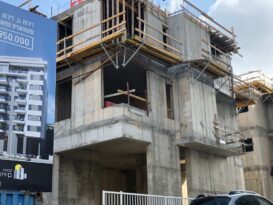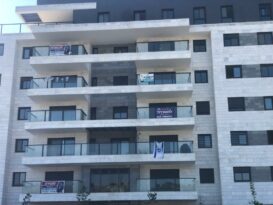After several consecutive weeks of the US dollar weakening, the trend has changed, and the dollar has begun to strengthen against the shekel. Real estate and finance professionals working with overseas buyers confirm that there has recently been an increase in interest among foreign buyers citing the increase in the strength of the dollar as only one of the reasons, and not necessarily the main one.
Relative to previous decades, 2022 was one of the most turbulent years in the global economy. Between rising inflation and the frequent interest rate increases, it was easy to miss another significant movement— the dollar returned to a strengthening against the shekel, after several consecutive years in which it was on a downward trend.
Exactly one year ago, in November 2021, a prolonged period of devaluation against the shekel brought the dollar’s exchange rate to a historic low of NIS 3.06, and many had begun to predict that it will fall below NIS 3. The Bank of Israel, for its part, began an aggressive purchase of dollars in order to halt the decline in its value, which endangered the stability of manufacturers and exporters. The trend has indeed halted, and since then and throughout the past year, the dollar has climbed again, until in the past two months it stabilized at a level of NIS 3.5-3.6 – about 16 percent higher than its value a year ago.
Naturally, the strengthening of the dollar against the shekel should make it easier to buy apartments in Israel for those whose capital and salaries are in dollars, primarily American Jews. However, conversations with those involved in Israel real estate projects that appeal to these audiences reveals a more complex picture. Additional variables, such as the increase in home prices in Israel, and the rising interest rates, have moderated the effect of the strengthening of the dollar. It should also be remembered that when it comes to the purchase of a new apartment where payments may be spread out over a long period, the significance of the dollar rate on the date on which the transaction was signed is limited.
Sharon Shitrit, the owner, and CEO of Sharon Shitrit Real Estate Marketing & Consulting who works primarily with developers of luxury projects says that “it is too early to assess the effects of the strengthening of the dollar, the market takes several months to digest.” However, he said, the sense of stagnation that prevailed in the market of non-resident buyers until six months ago, when both the dollar and the euro were at a low point, has disappeared. “At a time when the euro, pound, and dollar currencies crashed, there was unequivocally a halt in transactions. Now, however, interest is back, and this means, eventually, more deals. This is also the reason why in recent weeks I have returned to carry out marketing activities abroad, after having taken a break.”
Data recently published by the Ministry of Finance support the sense of awakening that Shitrit describes. According to the data, during the second half of 2022, there was a 42% increase in non-residents’ purchases compared to the same period last year, and 519 home purchases by non-residents, in total. It was also noted that this increase was largely due to sales campaigns by contractors, particularly in luxury projects, and that more than half of the purchases were concentrated in the Jerusalem area.
Among the projects in which Shitrit has been involved in recent years and which have appealed to foreign buyers, is the “Basel” project in the center of Tel Aviv of the companies JTLV and the White City buildings, the “Duo” tower project being built by Africa Israel at the corner of Ibn Gvirol and Arlozorov streets, which is currently being marketed, and others. According to Shitrit, “There are those for whom the exchange rates do not matter. I recently signed a deal with a British Jew who purchased an apartment for NIS 50 million. From what I could tell, the weakening of the pound against the shekel did not interest him so much.
“But for ordinary buyers, it’s not that simple. The interest rate has risen, and the price of apartments in Tel Aviv has also increased dramatically in a few years, much more than in Paris, for example. The ability of non-residents to buy apartments in Israel is dwindling.” On the other hand, Shitrit argues that there is a positive influence of other factors, not necessarily financial, that influence non-residents to purchase an apartment. “In both France and the United States, there are more and more buyers who feel the need to buy property in Israel, without immigrating for the time being.”
Eva Peretz, a mortgage consultant specializing in foreign residents and new immigrants, presents a less optimistic opinion and does not attach much importance to the strengthening of foreign currencies against the shekel. “A year and a half ago, the euro was around four shekels, but then it plummeted. The fact that it has risen in recent months to more than 3.5 shekels does not make European buyers feel like they’re getting a good deal. In their minds, it should be much stronger.”
As a rule, she argues, Jewish buyers who want to own an apartment in Israel usually are not concerned about the currency. “If you look at, for example, the corona period, when the dollar was at a low point against the shekel, it was precisely then that there were more transactions. Those who are sensitive to the currency exchange rate are generally investors. But for these buyers, there are now several moderating factors—the sharp price hikes of recent years, and the increase in interest rates, which make a purchase now less worthwhile.”
It, therefore, appears that, at least at this stage, the effect of the strengthening of the dollar, and the strengthening of the euro, has not yet led to any dramatic change in the volume of home purchases by Jews living abroad. While the current economic climate does not encourage business transactions or large investments, it certainly impacts homebuying in Israel among foreign residents. However, periods of political instability are generally a catalyst for members of Jewish communities abroad who are considering the possibility of aliyah, or at least of purchasing property in Israel as a first and non-binding step, to get moving and purchase.
It seems that this is indeed what we’re seeing today. The strengthening of the dollar and the euro may not be a major consideration for those purchasing a home, but it certainly makes it a whole lot easier.








